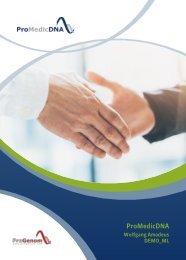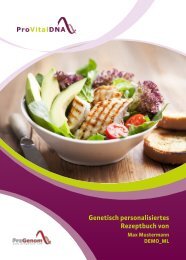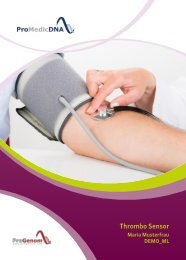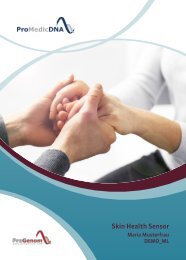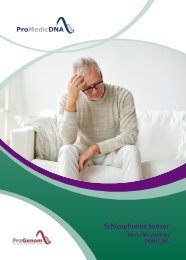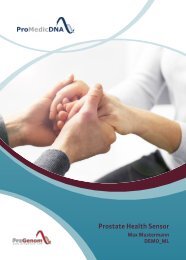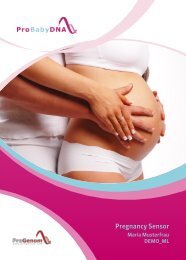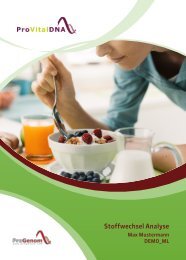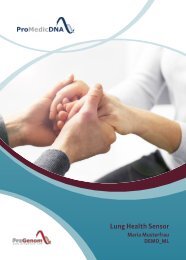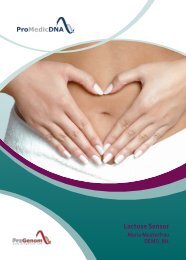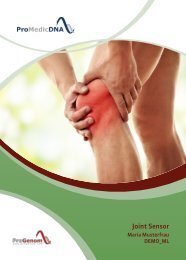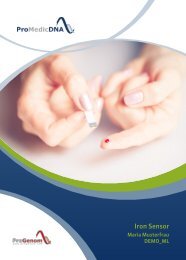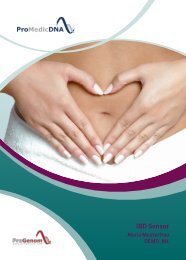Wissenschaftliche Grundlage Weight Wensor
Sie wollen auch ein ePaper? Erhöhen Sie die Reichweite Ihrer Titel.
YUMPU macht aus Druck-PDFs automatisch weboptimierte ePaper, die Google liebt.
<strong>Wissenschaftliche</strong> <strong>Grundlage</strong> – <strong>Weight</strong> Sensor
ÜBERGEWICHT<br />
Die Zwei Faktoren bei Übergewicht<br />
Zu wenig Bewegung<br />
Zu viel Essen<br />
Warum sind bei gleichem Lebensstil manche<br />
schlank und manche Übergewichtig?
ÜBERGEWICHT<br />
Folgende Gene / Polymorphismen werden analysiert:<br />
Der Zustand dieser Gene / Polymorphismen wird in die folgenden Kategorien<br />
eingestuft:<br />
OK (Homozygot Wildtyp)<br />
Beeinträchtigt (Heterozygot)<br />
Defekt (Homozygot mutant)<br />
Aus den Ergebnissen lassen sich viele genetische Veranlagungen schließen:
Studien<br />
Wie werden Studien durchgeführt?<br />
Eine genetische Studien beginnt mit einer Hypothese, als eine Vermutung<br />
dass eine Genmutation eine bestimmte Auswirkung auf das Körpergewicht<br />
hat.<br />
Ist die Hypothese zum Beispiel, dass eine bestehende<br />
Genmutation Gewichtsverlust durch Sport verhindert, werden<br />
zunächst Probanden gefunden.<br />
Je mehr Probanden an der Studie teilnehmen umso genauer werden die<br />
Ergebnisse. Sind ausreichend Probanden gefunden, wird als nächstes eine<br />
Genanalyse durchgeführt. Dadurch kann man die Probanden in zwei<br />
verschiedenen Gruppen einteilen: Die mit und die ohne Genmutation.
Studien<br />
1) Hypothese: Die Genmutation verhindert Gewichtsverlust durch Sport<br />
2) Probanden werden gefunden<br />
Wie werden Studien durchgeführt?<br />
1000 Probanden<br />
3) Ein Gentest wird gemacht<br />
500 ohne Genmutation 500 mit Genmutation
Studien<br />
4) Gewicht wird gemessen<br />
Wie werden Studien durchgeführt?<br />
5) Sportprogramm wird begonnen (6 Monate 3x wöchentlich Sport)<br />
500 ohne Genmutation 500 mit Genmutation<br />
Nach den sechs Monaten wird das Körpergewicht jedes einzelnen Probanden<br />
erneut gemessen. Anschließend errechnet man den durchschnittlichen<br />
Gewichtsverlust in der Gruppe mit und ebenfalls in der Gruppe ohne der<br />
Genmutation .
Studien<br />
Wie werden Studien durchgeführt?<br />
6) Gewicht wird gemessen und Verlust errechnet<br />
500 ohne Genmutation<br />
Durchschnittlich-8kg<br />
500 mit Genmutation<br />
Durchschnittlich -2 Kg<br />
7) Aussage: Die Genmutation reduziert die Effektivität der<br />
Gewichtsabnahme durch Sport.<br />
Der einzige Unterschied zwischen den beiden Gruppen war dieser eine<br />
Genmutation .<br />
Ist ein statistisch signifikanter Unterschiede zwischen beiden Gruppen, lässt sich<br />
die Hypothese bestätigen. In diesem Beispiel bestätigt sich, dass diese<br />
Genmutation die Effektivität des Abnehmers durch Sport deutlich reduziert. Das<br />
war ein fiktives Beispiel, kommen wir nun zu den richtigen wissenschaftlichen<br />
Studien:
Studien<br />
Studien zu Genmutationen<br />
Keine Genmutation<br />
Genmutation<br />
(Pro12Ala PPARG-Gen)<br />
Studie 1-30<br />
X-Tausend Probanden<br />
Normaler BMI<br />
Erhöhter BMI<br />
Rankinen et al., Obesity 14: 529-644<br />
Studie 31<br />
720 Probanden<br />
Studie 32<br />
343 Probanden<br />
Experiment: Fettreiche Ernährung<br />
Gleichbleibender BMI Steigender BMI<br />
Robitaille et al., Clin Genet 63: 109-116, 2003<br />
Experiment: Mehr Fett in Ernährung<br />
Keine Gewichtszunahme Gewichtszunahme<br />
Memisoglu et al., Human Molecular Genetics 12: 2923-2929, 2001<br />
Studie 33<br />
522 Probanden<br />
Experiment: 3 Jahre Diät und Sport<br />
8,3 Kg Abnahme 3,4 Kg Abnahme<br />
1 Jahr Später:<br />
Hohe Gewichtszunahme Geringe Gewichtszunahme<br />
Lindi et al., Diabetes 51: 2581-2586, 2002<br />
>>>7500 weitere Studien zu diesem Gen
Studien<br />
Studien zu Genmutationen<br />
Keine Genmutation<br />
Genmutation<br />
(Ala57Thr im FABP2 Gen)<br />
Studie 1<br />
507 Probanden<br />
Studie 2<br />
395 Probanden<br />
Normaler BMI Erhöhter BMI<br />
Hegele et al., Clin Endocrinol Metab 81: 4334-4337, 1996<br />
Normaler Bauchumfang Erhöhter Bauchumfang<br />
Yamada et al., Diabetologia 40: 706-710, 1997<br />
Studie 3<br />
18 Probanden<br />
Studie 4<br />
15 Probanden<br />
Studie 5<br />
69 Probanden<br />
Experiment: Fettreiches Essen<br />
Fettsäuren normal Fettsäuren 20% höher<br />
Pratley et al., J Lipid Res 41: 2002-2008, 2000<br />
Experiment: Fettreiches Essen<br />
Triglyceride normal Triglyceride höher<br />
Agren et al., Arterioscler Thromb Vasc Biol 18: 1606-1610, 1998<br />
Experiment: 3 Monate 1300 kcal, 4x Sport pro Woche<br />
Fett, LDL und Leptin nahm ab Fett, LDL und Leptin blieb konstant<br />
Agren et al., Arterioscler Thromb Vasc Biol 18: 1606-1610, 1998
Studien<br />
Studien zu Genmutationen<br />
Keine Genmutation<br />
Genmutation<br />
(Ala57Thr im FABP2 Gen)<br />
Studie 6<br />
59 Probanden<br />
Studie 7<br />
80 W Probanden<br />
Experiment: Fettreiche Ernährung 3 Wochen lang<br />
Normaler Blutzucker Erhöhter Blutzucker<br />
Marin et al., Am J Clin Nutr 82: 196-200, 2005<br />
Experiment: Diät und Sportprogramm<br />
Gewichtsverlust Kein Gewichtverlust<br />
Takakura et al., Diabetes Research and Clinical Practice 67: 36-42, 2005<br />
>>> 167 weitere Studien zu diesem Gen
Studien<br />
Studien zu Genmutationen<br />
Diese Gene wurden insgesamt in über 7000 Studien erforscht. Hier eine kurze<br />
Zusammenfassung der Anzahl der Studien:<br />
Das Gen ADRB2<br />
(Arg16Gly im ADRB2 Gen)<br />
>>> 6897 Studien zu diesem Gen<br />
Das Gen ADRB3<br />
(Arg64Trp im ADRB3 Gen)<br />
>>> 114 Studien zu diesem Gen<br />
Das Gen FTO<br />
(rs9939609 im FTO Gen)<br />
>>> 493 Studien zu diesem Gen
Studien<br />
Studien zu Genmutationen<br />
"Diabetes August 2002 vol. 51 no. 8 2581-2586, Association of the Pro12Ala Polymorphism in the PPAR-γ2 Gene With 3-Year Incidence of Type 2 Diabetes and Body <strong>Weight</strong> Change in the Finnish Diabetes<br />
Prevention Study, Virpi I. Lindi1, Matti I.J. Uusitupa1, Jaana Lindström2, Anne Louheranta1, Johan G. Eriksson2, Timo T. Valle2, Helena Hämäläinen3, Pirjo Ilanne-Parikka4, Sirkka Keinänen-Kiukaanniemi5,<br />
Markku Laakso6, Jaakko Tuomilehto7 and for the Finnish Diabetes Prevention Study GroupDiabetes August 2002 vol. 51 no. 8 2581-2586,Association of the Pro12Ala Polymorphism in the PPAR-γ2 Gene With 3-<br />
Year Incidence of Type 2 Diabetes and Body <strong>Weight</strong> Change in the Finnish Diabetes Prevention Study, Virpi I. Lindi1, Matti I.J. Uusitupa1, Jaana Lindström2, Anne Louheranta1, Johan G. Eriksson2, Timo T. Valle2,<br />
Helena Hämäläinen3, Pirjo Ilanne-Parikka4, Sirkka Keinänen-Kiukaanniemi5, Markku Laakso6, Jaakko Tuomilehto7 and for the Finnish Diabetes Prevention Study Group"<br />
Obesity (Silver Spring). 2011 Jan,19(1):212-5.Epub 2010 Jun 3.Role of β₂-adrenergic receptor polymorphisms on body weight and body composition response to energy restriction in obese women: preliminary<br />
results.Ruiz JR, Larrarte E, Margareto J, Ares R, Labayen I.<br />
Clin Genet. 2005 Aug:68(2):152-4.Apolymorphism in the apolipoprotein A5 gene is associated with weight loss after short-term diet. Aberle J, Evans D, Beil FU, Seedorf U.<br />
J Clin Endocrinol Metab. 1996 Dec:81(12):4334-7.Genetic variation of intestinal fatty acid-binding protein associated with variation in body mass in aboriginal Canadians.Hegele RA, Harris SB, Hanley AJ,<br />
Sadikian S, Connelly PW, Zinman B.<br />
Obesity (Silver Spring). 2006 Apr:14(4):529-644.Thehuman obesity gene map: the 2005 update.Rankinen T, Zuberi A, Chagnon YC, Weisnagel SJ, Argyropoulos G, Walts B, Pérusse L, Bouchard C.<br />
"Circulation. 2005 Jun 28:111(25):3429-34.Epub 2005 Jun 13. Beta2- and beta3-adrenergic receptor polymorphisms are related to the onset of weight gain and blood pressure elevation over 5 years. Masuo K,<br />
Katsuya T, Fu Y, Rakugi H, Ogihara T, Tuck ML."<br />
The ADRB3 Trp64Argvariant and BMI: a meta-analysis of 44 833 individuals. by N Kurokawa, E H Young, Y Oka, H Satoh, N J Wareham, M S Sandhu, R J F Loos, International journal of obesity 2005 (2008)<br />
Volume: 32, Issue: 8, Pages: 1240-1249<br />
"Clin Chem. 2007 Jun:53(6):1144-52.Epub 2007 Apr 19. The -256T>C polymorphism in the apolipoprotein A-II gene promoter is associated with body mass index and food intake in the genetics of lipid<br />
lowering drugs and diet network study. Corella D, Arnett DK, Tsai MY, Kabagambe EK, Peacock JM, Hixson JE, Straka RJ, Province M, Lai CQ, Parnell LD, Borecki I, Ordovas JM."<br />
Diabetes. 2010 January; 59(1): 311–318.Prevalence of Loss-of-Function FTO Mutations in Lean and Obese Individuals, David Meyre,1 Karine Proulx,2 Hiroko Kawagoe-Takaki,3 Vincent Vatin,1 Ruth Gutiérrez-<br />
Aguilar,1 Debbie Lyon,3 Marcella Ma,2 Helene Choquet,1 Fritz Horber,4 Wim Van Hul,5 Luc Van Gaal,6 Beverley Balkau,7 Sophie Visvikis-Siest,8 François Pattou,9 I. Sadaf Farooqi,2 Vladimir Saudek,2 Stephen<br />
O'Rahilly,2 Philippe Froguel,1,10 Barbara Sedgwick,3 and Giles S.H. Yeo2<br />
"J Mol Med (Berl). 2007 Feb:85(2):119-28.Epub 2007 Jan 9. APOA5 gene variation modulates the effects of dietary fat intake on body mass index and obesity risk in the Framingham Heart Study. Corella D, Lai<br />
CQ, Demissie S, Cupples LA, Manning AK, Tucker KL, Ordovas JM."<br />
"Diabetologia. 1997 Jun:40(6):706-10.Association between Ala54Thr substitution of the fatty acid-binding protein 2 gene with insulin resistance and intra-abdominal fat thickness in Japanese men. Yamada K,<br />
Yuan X, Ishiyama S, Koyama K, Ichikawa F, Koyanagi A, Koyama W, Nonaka K."<br />
The PPAR-gamma P12A polymorphism modulates the relationship between dietary fat intake and components of the metabolic syndrome: results from the Québec Family Study, J Robitaille1,2, J-P<br />
Després1,2,3,L Pérusse4, M-C Vohl1,2,<br />
"Int J Obes (Lond). 2005 May:29(5):449-57.Association of adipose tissue deposition and beta-2 adrenergic receptor variants: the IRAS family study. Lange LA, Norris JM, Langefeld CD, Nicklas BJ, Wagenknecht<br />
LE, Saad MF, Bowden DW."<br />
"Clin Endocrinol (Oxf). 2003Oct:59(4):476-81.The glutamine 27 glutamic acid polymorphism of the beta2-adrenoceptor gene is associated with abdominal obesity and greater risk of impaired glucose<br />
tolerance in men but not in women: a population-based study in Spain. González Sánchez JL, Proenza AM, Martínez Larrad MT, Ramis JM, Fernández Pérez C, Palou A, Serrano Ríos M."<br />
Apolipoprotein A-II polymorphism and visceral adiposity in African-American and white women.Lara-Castro C, Hunter GR, Lovejoy JC, Gower BA, Fernández JR. Obes Res. 2005 Mar:13(3):507-12.<br />
Clin Genet. 2002 Apr:61(4):305-7.The 27Glu polymorphism of the beta2-adrenergic receptor gene interacts with physical activity influencing obesity risk among female subjects. Corbalán MS, Marti A, Forga L,<br />
Martínez-González MA, Martínez JA.<br />
Obesity (Silver Spring). 2010 Mar:18(3):641-3.Epub 2009 Oct 1. FTO genotype and the weight loss benefits of moderate intensity exercise. Mitchell JA, Church TS, Rankinen T, Earnest CP, Sui X, Blair SN.<br />
Int J Obes Relat Metab Disord. 2003 Sep:27(9):1028-36.Difficulty in losing weight by behavioral intervention for women with Trp64Argpolymorphism of the beta3-adrenergic receptor gene. Shiwaku K, Nogi<br />
A, Anuurad E, Kitajima K, Enkhmaa B, Shimono K, Yamane Y.<br />
"J Biol Chem. 2001 Oct 26:276(43):39679-84.Epub 2001 Aug 3. The polymorphism at codon 54 of the FABP2 gene increases fat absorption in human intestinal explants. Levy E, Ménard D, Delvin E, Stan S,<br />
Mitchell G, Lambert M, Ziv E, Feoli-Fonseca JC, Seidman E."<br />
Arterioscler Thromb Vasc Biol. 1998 Oct:18(10):1606-10.Postprandial lipemic response is modified by the polymorphism at codon 54 of the fatty acid-binding protein 2 gene. Agren JJ, Valve R, Vidgren H,<br />
Laakso M, Uusitupa M.<br />
Obes Res. 2004 Feb:12(2):340-5.Intestinal FABP2 A54T polymorphism: association with insulin resistance and obesity in women. Albala C, Santos JL, Cifuentes M, Villarroel AC, Lera L, Liberman C, Angel B,<br />
Pérez-Bravo F.
Studien<br />
Studien zu Genmutationen<br />
Metabolism. 2005 Dec:54(12):1652-8. Comparison of the acute response to meals enriched with cis- or trans-fatty acids on glucose and lipids in overweight individuals<br />
with differing FABP2 genotypes. Lefevre M, Lovejoy JC, Smith SR, Delany JP, Champagne C, Most MM, Denkins Y, de Jonge L, Rood J, Bray GA.<br />
American Journal of Hypertension 18, 1508-1516 (November 2005), Rebound <strong>Weight</strong> Gain as Associated With High Plasma Norepinephrine Levels That Are<br />
Mediated Through Polymorphisms in the β2- AdrenoceptorRebound <strong>Weight</strong> Gain as Associated With High Plasma Norepinephrine Levels That Are Mediated<br />
Through Polymorphisms in the β2-Adrenoceptor<br />
Wellcome Trust Case Control Consortium. Nature. 2007 Jun 7.447(7145):661-78.Genome-wide association study of 14,000 cases of seven common diseases and 3,000<br />
shared controls.<br />
Frayling, T. M., Timpson, N. J., Weedon, M. N., Zeggini, E., Freathy, R. M., Lindgren, C. M., Perry, J. R., Elliott, K. S., Lango, H., Rayner, N. W., Shields, B., Harries, L. W.,<br />
Barrett, J. C., Ellard, S., Groves, C. J., Knight,<br />
B., Patch, A. M., Ness, A. R., Ebrahim, S., Lawlor, D. A., Ring, S. M., Ben-Shlomo, Y., Jarvelin, M. R., Sovio, U., Bennett, A. J., Melzer, D., Ferrucci, L., Loos, R. J., Barroso, I.,<br />
Wareham, N. J., Karpe, F., Owen, K. R., Cardon, L. R., Walker, M., Hitman, G. A., Palmer, C. N., Doney, A. S., Morris, A. D., Smith, G. D., Hattersley, A. T., and McCarthy, M.<br />
I. (2007). A common variant in the FTO gene is associated with body mass index and predisposes to childhood and adult obesity. Science 316, 889–894.<br />
"Arch Intern Med. 2009 Nov 9:169(20):1897-906. APOA2, dietary fat, and body mass index: replication of a gene-diet interaction in 3 independent populations.<br />
Corella D, Peloso G, Arnett DK, Demissie S, Cupples LA, Tucker K, Lai CQ, Parnell LD, Coltell O, Lee YC, Ordovas JM."<br />
"J Nutr. 2003 Aug:133(8):2549-54. Obesity risk is associated with carbohydrate intake in women carrying the Gln27Glu beta2-adrenoceptor polymorphism. Martínez<br />
JA, Corbalán MS, Sánchez-Villegas A, Forga L, Marti A, Martínez-González MA."<br />
Int J Obes Relat Metab Disord. 2002 Jul:26(7):928-37. Influence of the beta2-adrenergic receptor Arg16Gly polymorphism on longitudinal changes in obesity from<br />
childhood through young adulthood in a biracial cohort: the Bogalusa Heart Study. Ellsworth DL, Coady SA, Chen W, Srinivasan SR, Elkasabany A, Gustat J,<br />
Boerwinkle E, Berenson GS.<br />
Arch Pediatr Adolesc Med. 2010 Apr:164(4):328-33. Attenuation of the effect of the FTO rs9939609 polymorphism on total and central body fat by physical activity<br />
in adolescents: the HELENA study. Ruiz JR, Labayen I, Ortega FB, Legry V, Moreno LA, Dallongeville J, Martínez-Gómez D, Bokor S, Manios Y, Ciarapica D, Gottrand F, De<br />
Henauw S, Molnár D, Sjöström M, Meirhaeghe A; HELENA Study Group.<br />
Int J Obes Relat Metab Disord. 2002 Apr:26(4):517-28. Genetic factors as predictors of weight gain in young adult Dutch men and women. van Rossum CT, Hoebee B,<br />
Seidell JC, Bouchard C, van Baak MA, de Groot CP, Chagnon M, de Graaf C, Saris WH.<br />
Diabetes Obes Metab. 2002 Nov:4(6):428-30. TRP64ARG polymorphism of the beta 3-adrenergic receptor gene and obesity risk: effect modification by a sedentary<br />
lifestyle. Marti A, Corbalán MS, Martínez- Gonzalez MA, Martinez JA.<br />
Am J Clin Nutr. 2009 Dec:90(6):1483-8. Epub 2009 Oct 14. The FTO gene rs9939609 obesity-risk allele and loss of control over eating. Tanofsky-Kraff M, Han JC,<br />
Anandalingam K, Shomaker LB, Columbo KM, Wolkoff LE, Kozlosky M, Elliott C, Ranzenhofer LM, Roza CA, Yanovski SZ, Yanovski JA.<br />
Cecil, J. E., Tavendale, R., Watt, P., Hetherington, M. M., and Palmer, C. N. (2008). An obesity-associated FTO gene variant and increased energy intake in children. N.<br />
Engl. J. Med. 359, 2558–2566.<br />
den Hoed, M., Westerterp-Plantenga, M. S., Bouwman, F. G., Mariman, E. C., and Westerterp, K. R. (2009). Postprandial responses in hunger and satiety are<br />
associated with the rs9939609 single nucleotide polymorphism in FTO. Am. J. Clin. Nutr. 90, 1426–1432.
Studien<br />
Studien zu Genmutationen
Studien<br />
Studien zu Genmutationen
Studien<br />
Studien zu Genmutationen
Studien<br />
Studien zu Genmutationen
ÜBERGEWICHT<br />
Bringt genetische Information einen Nutzen?<br />
Unsere eigene genetische Studie:<br />
The application of personal genetic information for<br />
improved weight loss: A comparative study<br />
Daniela Feinweber 1 , Saskia Degenhart 1 , Rene Rohrmanstorfer 1 ,<br />
Florian Schneebauer 1 , Daniel Wallerstorfer 1
ÜBERGEWICHT<br />
Körpergewicht<br />
Unsere eigene Studie<br />
139 Teilnehmer<br />
Ergebnis: 2,4-Mal mehr Gewichtsverlust<br />
(P
ÜBERGEWICHT<br />
Unsere eigene Studie<br />
Ergebnis: Je mehr Anfangsgewicht, desto effektiver<br />
BMI 18-25<br />
BMI 25-30 BMI 30+<br />
-2.68kg<br />
(mean -2.686±1.398 s.d., p
ÜBERGEWICHT<br />
Vergleich Genetik gegen Nicht-Genetik<br />
?<br />
Ohne Gentest<br />
Wenig Sport<br />
Sehr wenig<br />
essen<br />
Fettarme<br />
Ernährung<br />
Genetische Veranlagung<br />
Sport sehr effektiv<br />
Wenig Essen weniger<br />
Effektiv<br />
Kohlenhydratempfindlich<br />
MIT Gentest<br />
Viel Sport<br />
Etwas<br />
weniger essen<br />
Kohlenhydratarme<br />
Ernährung<br />
-5kg<br />
2.5 Mal mehr Erfolg >><br />
-12.5kg
Für weitere Auskünfte zu den Studien und zu unserer<br />
genetischen Gewichtsanalyse stehen wir Ihnen jederzeit<br />
gerne zur Verfügung.<br />
Wir freuen uns auf Sie!




